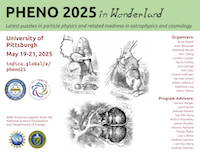Speaker
Manuel Díaz
(U. Massachusetts Amherst)
Description
We employ a gauge-invariant perturbative framework to analyze the next-to-leading order (NLO) effective action of the SU(2)-Higgs model at finite temperature. This involves utilizing a specific power counting scheme, which allows us to compute gauge-invariant observables for primordial gravitational waves arising from a thermal first-order electroweak phase transition. Finally, we then compare our results with findings from pre-existing non-perturbative analyses, effectively benchmarking the framework's validity and assessing its implications on the need to reevaluate the validity of predictions by BSM models in the literature about the detectability of these primordial gravitational waves by forthcoming experiments such as LISA.
Authors
Leon Friedrich
(The University of Melbourne)
Manuel Díaz
(U. Massachusetts Amherst)
Michael Ramsey-Musolf
(U. Massachusetts Amherst)
Michael Ramsey-Musolf

